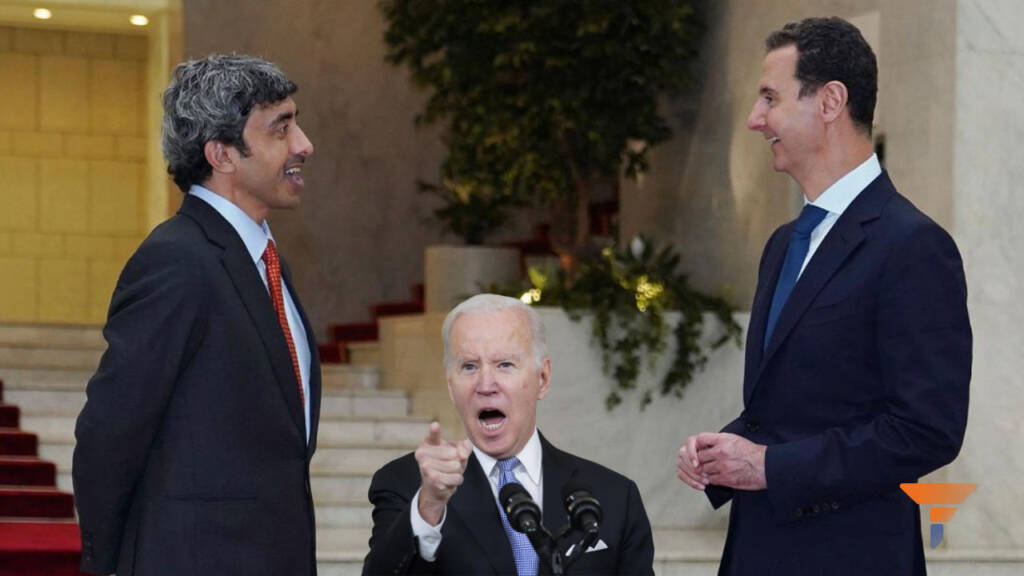The declining importance of the US under the disastrous leadership of Joe Biden in the Middle East has made Washington lose many allies. Since the Arab Spring, UAE is well aware of the fragility of order in the region, and with Joe Biden abandoning its allies, things can go from bad to worse really fast. This realisation, coupled with the new outlook and approach to achieve peace in the Middle East has had an evident impact on the way Arabs approach Syria.
Since it became evident that the Assad government had triumphed over the decade-long proxy war waged by the West and Gulf states to overthrow the Syrian regime, Arab countries have made modest but steady steps to improve relations with Syria.
For the first time since the conflict began in 2011, Syrian President Bashar al-Assad met with the leader of an Arab country on Friday. It was none other than the United Arab Emirates, a close friend of the United States and Saudi Arabia. After being labelled an international ‘pariah’ for so long, seeing Assad in images speaking cheerfully to Abu Dhabi Crown Prince Sheikh Mohammed bin Zayed al-Nahyan came as a shock to many.
According to the UAE state press, the UAE sheikh “emphasized that Syria is a crucial pillar of Arab security and that the UAE is willing to enhance relations with it.” Assad also met with Sheikh Mohammed bin Rashid Al Maktoum, the UAE’s prime minister. According to the Associated Press, it is a “clear signal” of Assad’s reengagement with the Arab world as he “comes in from the cold” – with the possibility of Syria entering the Arab League in the future.
Visit that changes the Middle Eastern dynamics
Sheikh Mohammed stated his hope that “this visit will be the beginning of peace and stability for Syria and the entire region” during the meeting. The summit takes place just days after the 11th anniversary of the start of the Syrian revolt, which failed to depose al-Assad.
The meeting between Assad and Al Maktoum “dealt with the overall relations between the two countries and the prospects for expanding the circle of bilateral cooperation, especially at the economic, investment and commercial levels,” Syria’s state news agency SANA reported.
The visit is the clearest indication yet that some Arab countries are willing to interact with Syria’s once-vilified ruler. Several Arab countries, like Jordan and Lebanon, are rekindling ties with Assad, and have encouraged the US to lift sanctions on Damascus in order to boost commerce.
Joe Biden’s unhappiness
The Wall Street Journal wrote, “The Emirates, Egypt and Jordan are trying to bring him back into the Arab diplomatic fold—a move that could unlock trade benefits for all sides and reduce Iran’s influence. U.A.E. Foreign Minister Sheikh Abdullah bin Zayed met with Mr. Assad in Damascus in November, making him the most senior Emirati official to visit Syria since the start of the civil war.”
Perhaps to be expected, Washington was angered by UAE authorizing and welcoming the visit, slamming it as an “apparent attempt to legitimize” Assad. “We are profoundly disappointed and troubled by this apparent attempt to legitimize Bashar al-Assad, who remains responsible and accountable for the death and suffering of countless Syrians,” said State Department spokesman Ned Price said of the visit.
The visit by the Syrian leader to UAE comes at a time when the US is attempting to rally the world against Russia. In a bid to corner Russia, the US has even gone as far as to plead with Iran to fast track the JCPOA revival. Mainstreaming Iran at the expense of Arab nations is something that the UAE and Saudi Arabia won’t like. So, as Biden steps closer to according Iran with the new nuclear deal, and perhaps a license to bully Arab nations, the UAE is making it clear by embracing Syria that Biden’s moves to destabilize the Middle East will trigger an appropriate response from the key stakeholders.
